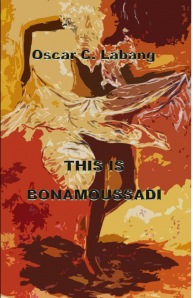Oscar C. Labang (PhD)
School of Professional Studies
Avila University, Kansas City, MO
For a very long time now, I have struggled with inner pressures not to join in this theoretical quibbling about Anglophone Cameroon Literature and just content my soul in a quiet corner and make my modest contributions (whatsoever) to projecting it to the heights that it deserves. I have tried not to enter the debate but to use the usually very informative and enthusiastic arguments to develop something.
This escape is somewhat part of my upbringing. My father was a teacher with a Psychology (Education) background and he often thought me that life is made better by doing your share to the best of your ability not by asking who has not done their share. It is pretty interesting how boyhood scolding can resurface now. As much as I try to avoid asking the questions, it seems the critical effort just like its seismic half never goes away when you want. Consequently, I have chosen to develop a series of short follow-up essays on what is clipping the wings of Anglophone Cameroon Literature (ACL). Evidently, I am plucking my immediate inspiration from Dibussi Tande’s interesting and cogent argument titled Soaring with “Clipped Wings”: Anglophone Cameroon Literature on the Move.
The truth is that we are soaring. But the question is Can we soar better and higher than we are already doing? My answer is a quick and strong affirmation. Then, my research question follows: what is clipping our wings or stopping us from achieving these higher heights? As of this moment, two defining causes have come to mind— what I term lack of apologists and academic gangsterism. In this essay I will be concerned with the lack of apologists as a factor that prevents a minority literature from soaring very high.
Lack of Apologists
Anglophone Cameroon Literature (ACL) can comfortably be classified under Minority Literature. The definition and very nature of this literature justifies this position. No Minority Literature can survive without apologists. It needs critics who are dedicated to writing, commenting, reviewing and critiquing this literature in other to give it currency in the literary market place. It needs Journals, Reviews, Newsletters, Blogs and Notebooks dedicated to the publishing of any “trash” written about this literature. It needs writers’ associations, literary interest groups, genre associations/clubs, and literary pressure groups. It needs awards and prizes, honors and rewards. It needs conferences, symposia, readings, writers meetings, cafés, discussion and workshops. Anglophone Cameroon Literature is deficient in much of these.
The first proof of life and need for survival of a minority literature like ours is the need for a band of individuals who are dedicated to writing, commenting, reviewing and critiquing this literature in other to give it currency in the literary market place. The absence of reviews, commentary, and critique of a literature in the market place of literary culture is a clear indication that such a literature does not exist. Literature exists when people read it, mock it, play with it, evaluate it and celebrate it. When I talk about dedicated individuals, I mean people who love this literature for the sake of the literature and not out of need for promotion in the academia, or to achieve a particular political goal or as a favour to a colleague, or need for friendship.
Writing academic papers on a literature is the surest way of exposing that literature to a world of scholarship. But the problem with the way it is handled in ACL is what leads to problems. Much of academic writing on ACL is not born out of genuine love for the literature or the work in question but out of what I call “academic gangsterism”, which I will discuss in a later part. This attitude which presupposes that you belong to the academia to have your work read and interpreted by a scholar is a stifling attitude in ACL. I dare to borrow Guattari’s phrase to call this tendency “powerful signs which massacre desire.” (qtd. in What is A Minority Literature, 13). It massacres the desires of the writer who does not belong to the academia, as well as massacres the desires of readers who look to academic scholars to recommend beautiful works to them for consumption.
Many essays have blamed the Cameroon public for not reading ACL. The public has a reason, and a good one for the matter. The public does not have critics or reviewers or commentators who can tell them which book is good, for what reason and why. Let me give you a practical example; I read Bole Butake’s The Rape of Michelle as a secondary school student because I had heard waves about the great playwright at the University of Yaounde 1; then read Epie Ngome’s What God Has Put Asunder as a freshman, (thanks to Mbuh T. Mbuh who kept talking about this great play, and later flushed it down our throats against our desires. He had a good cause!!!). Besides these two playwrights whose other works I read for personal vanity, the others have been Bate Besong and John N. Nkengasong.
More than a decade after, it still lingers in my subconscious that these are the only readable playwrights. WHY? The answer is simply, the critics who projected these works to the masses and students have either turned to academic gangsterism or have given up the supreme task they took or have simply remained parochial. This means that Mathew Takwi, John Ngongkum Ngong, K.K Bonteh and the host of other playwrights I do not know have to sing their own songs. God forbid that the writer becomes the spokesperson of his own work.
Read the rest of this article on Bakwa Magazine, link below
See online: Anglophone Cameroon Literature: the Travails of a Minority Literature

